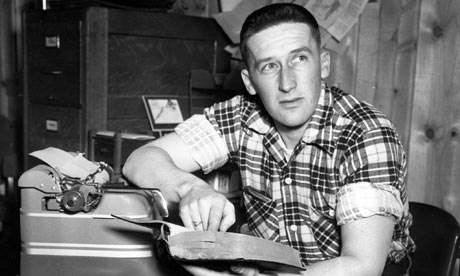 Today's Guest Blog comes to us courtesy of Larry Kahaner. Larry, the author of many non-fiction books, including the excellent AK-47: The Weapon that Changed the Face of War, is presently writing a thriller. He and Thriller Guy are writing pals and spend many long lunches delving into the intricacies of the thriller writing process. When TG runs flat up against a seemingly insoluble plot problem, Larry is his go-to guy for an original and clever solution.
Today's Guest Blog comes to us courtesy of Larry Kahaner. Larry, the author of many non-fiction books, including the excellent AK-47: The Weapon that Changed the Face of War, is presently writing a thriller. He and Thriller Guy are writing pals and spend many long lunches delving into the intricacies of the thriller writing process. When TG runs flat up against a seemingly insoluble plot problem, Larry is his go-to guy for an original and clever solution.
This is a true story.
Scene: A creative writers'
retreat.
Location: Picnic table among the
trees where residents congregate.
One resident, who was writing
historical fiction, had her research books in front of her when another
resident spied the classic "Caribbean" by James Michener. This other
resident had published one book of fiction, 20 years ago, about a young woman
and her life in the world of New York publishing. It was autobiographical, sexy
and trite. I would tell you her name but she comes from a line of famous
authors and it wouldn’t be cool. Suffice it to say that this one-book,
non-wonder has been trading on the family name for two decades and bounces
around creative centers, hoping to find her muse. She is what's known in the
biz as a 'residency slut,' and she would much rather put down the work of
others than sit her ass in the chair and pound out a few pages.
Focusing on the Michener tome she
says loud enough for everyone around to hear, and in her most condescending
voice, "Oh, isn't that just a page turner?"
The historical fiction writer
ignored the comment knowing full well that what was meant as a curse was a blessing.
Ask most would-be authors about their
main goals and you'll get a ton of answers like this:
"entertain…enlighten…write a clever plot… produce compelling
characters…"
What they never say is the most
important job of a writer, and I offer it here in big type so you can print it
out and tack it to your bulletin board or cut and paste it as your
screensaver:
Get the reader
to turn the page.
If you can do that, you have
reached your target. Writers write to be read. Period. (The logical extension
of being read is that people bought your book. Yeah, that's really the goal:
selling books, but that never happens if you're not being read, right?)
Almost half of all readers don't
finish a book because it's too slow or boring. They didn't turn the page.
So how do you force readers to
turn the page?
There are many ways, and for this
I turn to television. There's a rule in TV that no scene is static for more
than two seconds. After two seconds something has to change. Either the whole
scene changes, or, if it’s a close-up, a face grimaces, a voice calls, the
camera pans out… something has to change. TV folks know that movement equals
interest.
So it is with thrillers. For
readers to stay with you, you must provide constant action. Long gone are the
days of lengthy descriptions of people and landscapes. No more narratives that
don't move the story forward apace. And no longer do readers tolerate protracted
internal dialogue (this goes for dreams, too) unless there's movement and
action within it.
Use every trick, subterfuge and
ploy to get your reader to turn the page and that includes cliff hangers,
kicker-quote questions and bullets fired but have not yet reached their target
– and may not.
Be brave. Be sneaky. Be clever.
Do anything that works. Nothing is off limits except what I call the
"Superman Tease." As a boy I read Superman comic books as fast as
they were printed. The covers drew me in as they promised that Superman was going
to die, or he would destroy the earth or Lois Lane and the Man of Steel would
marry. Once paying my money and unable to wait, I read it on the street, only
to discover that the story took place in an alternative universe, it was a
dream or it was a bad guy in a Superman mask. Tease.
Although I was unsatisfied and
angry at how I was cheated, I continued to buy the comics until I got older and
was tired of being fooled.
Don't tease your readers without
a satisfying payoff.
Otherwise feel free to wheedle,
cajole, sweet talk and coax them into turning the page.
Do what you gotta do.
And that's all you gotta do.





